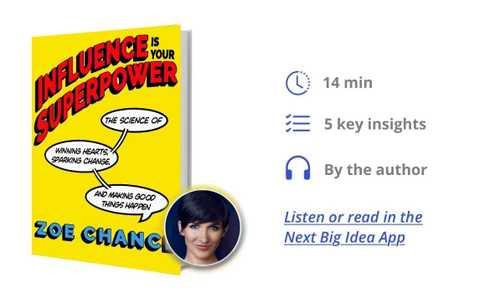Influence Is Your Superpower: The Science of Winning Hearts, Sparking Change, and Making Good Things Happen
Curated from: nextbigideaclub.com
Ideas, facts & insights covering these topics:
18 ideas
·5.02K reads
15
2
Explore the World's Best Ideas
Join today and uncover 100+ curated journeys from 50+ topics. Unlock access to our mobile app with extensive features.
Influence Will Realize Your Hopes And Desires
What do you wish for? Maybe you’re hoping to find meaningful work, lead a successful team, get a raise, share your art, fall in love and have a happy relationship, change a policy, change a politician, or save the planet. Or maybe, right now, you’d just like to get your kids to bed before you’re exhausted. The only way to make your dreams come true is to influence other people to change their behavior.
97
602 reads
But Influence Will Be Resisted
Trying to influence someone means you’re a threat to their time, money, pride, or social capital. Most importantly, influence threatens their attention. Attention is in short supply, and they’re already handling hundreds of influence attempts per day from marketing, kids, bosses, and internal temptations. It’s no wonder that when someone realizes you’re trying to influence them, their gut reaction is to say no or tune you out. They meet your pressure with resistance.
91
434 reads
Make Influence Pressureless
But when you make an invitation without any pressure whatsoever, people become inclined to lean forward. It’s one of the aikido moves for handling resistance. All you have to do is add a softener to your request like, “I know you’re probably busy,” or “please don’t say yes unless you really want to do this,” or “would you feel comfortable?”
101
411 reads
Make Influence Up Close And Personal
Keep in mind that people are more likely to say yes to a face-to-face request, and far less likely to respond to a social media post. The pressure and likelihood of saying yes depend on the closeness of the interaction. Use your own judgment about balancing the two, and focus on the long run. Conversion doesn’t happen in one conversation—it happens in a relationship.
93
375 reads
Influence Isn’t Rocket Science, But It Is A Science
Influence doesn’t work the way you think because you don’t think the way you think.
In a nutshell, there are two internal systems governing all our thinking and behavior. Behavioral economists call them System 1 and System 2. System 1 is fast, unconscious, emotional, and instinctive; these are your gut reactions. System 2 is slow, conscious, effortful, and seemingly rational; these are your deliberate decisions.
94
313 reads
Relationship Dynamics Of Gut Reactions & Deliberate Decisions
Because the unconscious mind (system 1) is fast, it is the first responder. The conscious mind (system 2) being slow, is the second-guesser. This means the unconscious mind has more influence on the conscious mind than vice versa. Gut reactions can, and often do, influence reasoning. Furthermore, because the conscious mind can focus on only one thing at a time, it has to ignore most of what’s going on in the world. As a result, people tend to make choices that require the least effort.
91
265 reads
To Shake [People Into] Decisions Don’t Stir [Gut] Reactions
We tend to overestimate the conscious mind because it’s the only one we can experience, but the unconscious mind is far more powerful. Being influential requires us to focus first and foremost on people’s gut reactions, and on making their path to a choice as easy as possible.
90
284 reads
The Best Predictor Of Behavior Is Ease
The biggest misperception about changing minds is that you need to do it at all.
A lot of our behavior doesn’t reflect any conscious thinking; that’s why the best predictor of behavior is ease. It’s more powerful than motivation, price, quality, satisfaction, or intentions.
97
266 reads
The Power Of Ease - The Customer Effort Score
You might not be selling something, but you can still take inspiration from a little-known marketing metric for measuring ease called the Customer Effort Score, which comes down to a simple question: How easy was it?
How customers answer this question explains one-third of their willingness to buy again, increase their business with the company, or rave about it to others. The Customer Effort Score is 12% more predictive of customer loyalty than customer satisfaction.
96
222 reads
Ease Tops Satisfaction *And* Trumps Dissatisfaction
Ease makes people happy, and effort can really annoy people. In a study of 75,000 customer service calls, researchers found that 81% of customers who reported a difficult experience said they intended to complain to friends or post negative reviews, while only 1% customers who reported having an easy experience said they would do the same. So, whenever you want to influence behavior, make that behavior as easy as possible.
93
203 reads
Make Influence Irresistible: Master Charisma
When Zoe Chance asks people which influence skill they’d like to master, the most common answer is charisma. When she asks what that means, they tell her charisma means people pay attention to you.
So how do we get people to pay attention to us? You could run through the office in your underwear, but that’s not exactly charismatic, is it?
Being charismatic isn’t something you are - it’s something you do. And you can become more charismatic–someone people want to pay attention to–with a few tweaks to your language, body language, and your attention.
95
202 reads
Charisma - Getting Attention By Giving Attention
The simplest charisma hack is to practice focusing your attention on people one at a time. Start by asking questions and using people’s names more often. Pronouns reveal where your attention is focused (not gender pronouns).
To have charisma is to shine so that other people feel like they’re the only one in the room, and people want to say yes to you.
98
204 reads
Authentic, Lasting Influence Is A Group Project
As our paths cross, entwine, diverge, and reconnect, we form a greater whole—an interconnected web of influence. You are already part of this collective power. The root of the word “influence” is the Latin influere, to flow in—as a river, a current. Your influence flows from other people and to other people, and from them to others, and so on. Sometimes you’re aware of your own ripple effects, sometimes not.
87
186 reads
Influence And Confluence
In 2005, the “Cajun Navy” rescued 10,000 of their neighbors from Hurricane Katrina. Rebecca Solnit writes in Hope in the Dark:
“In Hurricane Katrina, hundreds of boat-owners rescued people—single moms, toddlers, grandfathers—stranded in attics, on roofs, in flooded housing projects, hospitals, and school buildings. None of these people said, ‘I can’t rescue them all.’ All of them said, ‘I can rescue someone, and that’s work so meaningful and important I will risk my life and defy the authorities to do it.’ And they did.”
89
174 reads
The Seeds Of Influence
Sometimes we succeed, and sometimes our hearts break open. Sometimes inspiration strikes, our timing is perfect, luck is on our side, and the gates of heaven part for us. And all the time, the seeds of our influence are floating off like the tufts of a dandelion, carried on the wind. Whether we mean to or not, we are planting seeds. We are making history.
88
176 reads
Setting an example is not the main means of influencing others; it is the only means.
ALBERT EINSTEIN
90
228 reads
You don't have to be a 'person of influence' to be influential. In fact, the most influential people in my life are probably not even aware of the things they've taught me.
SCOTT ADAMS
89
249 reads
IDEAS CURATED BY
CURATOR'S NOTE
Insights on authentic influence, not “influencer influence”. Still, if influence is a superpower, and since we all might unconsciously be, or find ourselves, at either the giving or the receiving end of influence, it’s good to remember that where there are superpowers, there are of course superheroes, but there are also supervillains.
“
Xarikleia 's ideas are part of this journey:
Learn more about communication with this collection
How to network effectively
How to read body language
How to find common ground with others
Related collections
Similar ideas
5 ideas
15 ideas
How Minds Change: The Surprising Science of Belief, Opinion, and Persuasion
nextbigideaclub.com
15 ideas
Be Who You Want: Unlocking the Science of Personality Change
nextbigideaclub.com
Read & Learn
20x Faster
without
deepstash
with
deepstash
with
deepstash
Personalized microlearning
—
100+ Learning Journeys
—
Access to 200,000+ ideas
—
Access to the mobile app
—
Unlimited idea saving
—
—
Unlimited history
—
—
Unlimited listening to ideas
—
—
Downloading & offline access
—
—
Supercharge your mind with one idea per day
Enter your email and spend 1 minute every day to learn something new.
I agree to receive email updates




